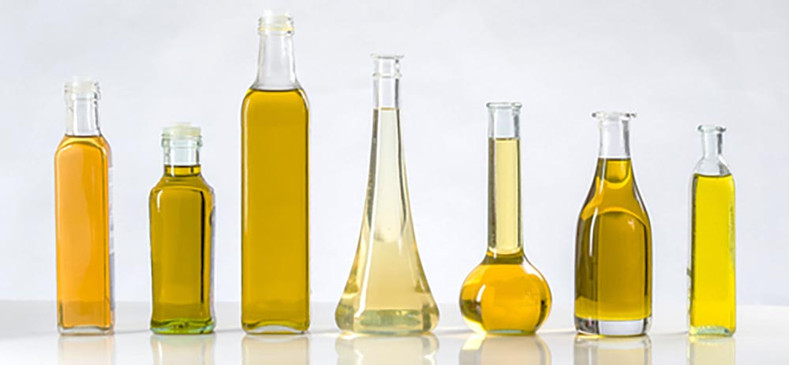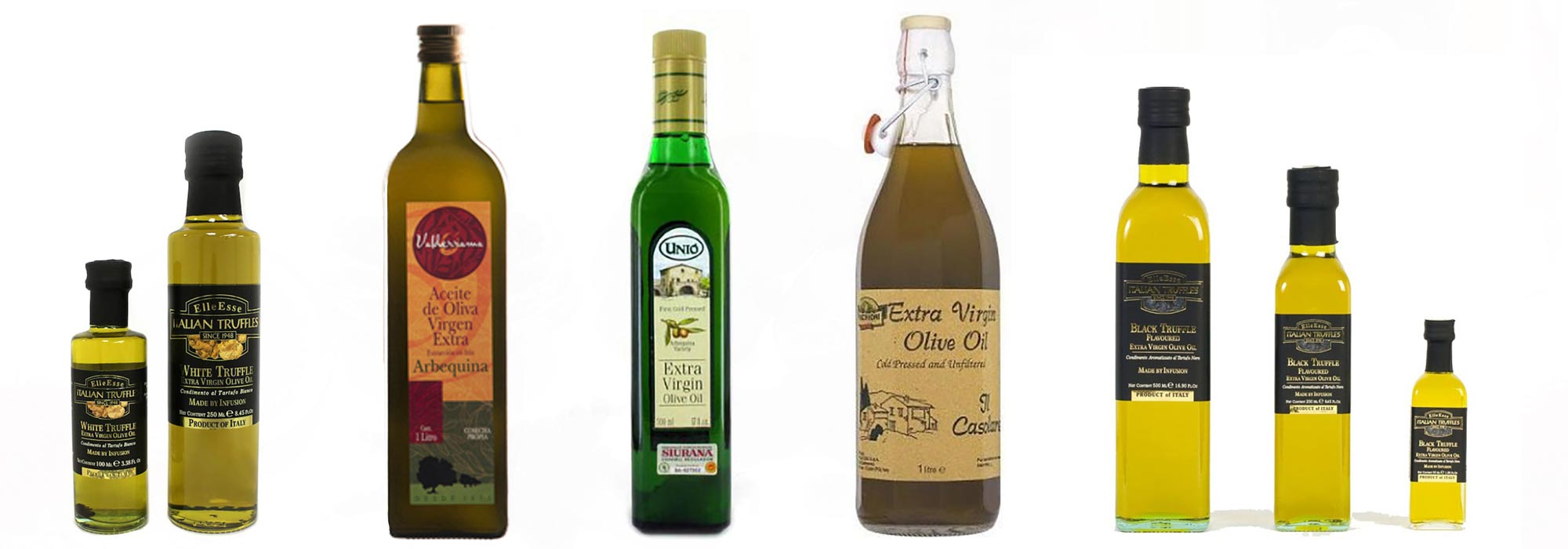The Difference Between Pure Olive Oil and Extra Virgin Olive Oil

"Olive oil" is simply the oil extracted from the fruit of olive trees, but not all are created equal. The numerous varieties you might see at your local super market can be mind-boggling, and using terms such as light, pure, classic, virgin, extra-virgin, first cold pressed and unfiltered to describe what's inside a bottle or tin doesn't always make it easy to pick the oil suitable for your culinary needs. If all these oils are all from olives then what exactly is the difference between one grade and another?
Although different species of olives grown in different countries can certainly create different tasting olive oils, the overall quality of a finished oil is determined by the process used in producing it. However, it is worth knowing that the process used to produce the oil is chosen after testing the quality of the raw oil extracted from the olives. The grade is a statement of an oils chemical components and its strength in pure olive flavor, as well as a statement of the extraction and refinement methods utilized to create the product.
The oil created from olives are generally grouped into refined or unrefined classifications, and graded based on level of acidity, or free oleic acid. All the olive oils will either be unrefined "virgin" oil, with strong flavor perfect for dressing salads and appetizers such as bruschetta, or refined pure olive oils, with lighter flavor and ideal cooking characteristics. Although the many types of olive oils can often be used interchangeably, it is important to know what makes them different from one another.

Unrefined Olive Oil
Extra Virgin Olive Oil is the highest grade and purest quality olive oil available. Industry standards for the extra-virgin grade require 100% purity; EVOO is unadulterated oil from olives using no chemicals or heat to extract oil from the fruit purity and a free fatty acid content no greater than 0.08%. In addition to chemical testing, the oil must also meet a organoleptic standard, with no defects of aroma or flavor, and a positive taste of green or ripe olives.
While there are many olive oils that claim to be true extra-virgin, few brands found on store shelves actually make the grade when tested, and fewer still are unfiltered or first cold-pressed, using ancient techniques and equipment to produce olive oil truly unhindered by true extra-virgin olive oils have been throughout history.
Virgin Olive Oil is unrefined oil usually with slight defects of aroma or flavor, lower chemical standards and higher free fatty acid levels than extra-virgin olive oil. Virgin oil is cheaper and less healthy than EVOO, but remains an unadulterated oil with sufficient quality too.
Refined Olive Oil
Pure Olive Oil, classic olive oil, regular olive oil, or more simply "olive oil", would be those oils of the olive fruit that do not qualify for the virgin designation due to acidity levels and other factors. Any olive oil that does not pass the virgin standards in chemical and organoleptic quality is refined with heat and/or chemicals to remove undesirable odors and flavors. The resulting product is bland, and almost colorless oil that is blended with a small amount of virgin olive oil to add just enough olive oil character.
Pure olive oil usually must contain at least 10% virgin oil and and oleic acid measuring between 3-4%. It is a popular all-purpose cooking oil because its higher smoke point and less apparent flavor than virgin oils.
Light Olive Oil and Extra Light Olive Oil are the lowest grades, having the lightest true flavor of olives. Although most people are lead to believe the term "light" translates to lower fat or calories that is not the case with light olive oil. Only the flavor is lighter as less than 10% virgin olive oil is added to light oils.
*Does Olive Oil go Bad?*
Yes, and rancid oil is more commonplace in America than you'd think...
Check out this in-depth article about fresh v. rancid olive oil health facts, shelf-life, and how to optimally store and dispose of your oil.
https://www.kitchenambition.
![]()
-
Sources:
https://www.tastingtable.com/cook/national/extra-v...
https://www.southernliving.com/fats/oils/olive-oil...
http://www.berkeleywellness.com/healthy-eating/foo...



 (888) 268-8780
(888) 268-8780